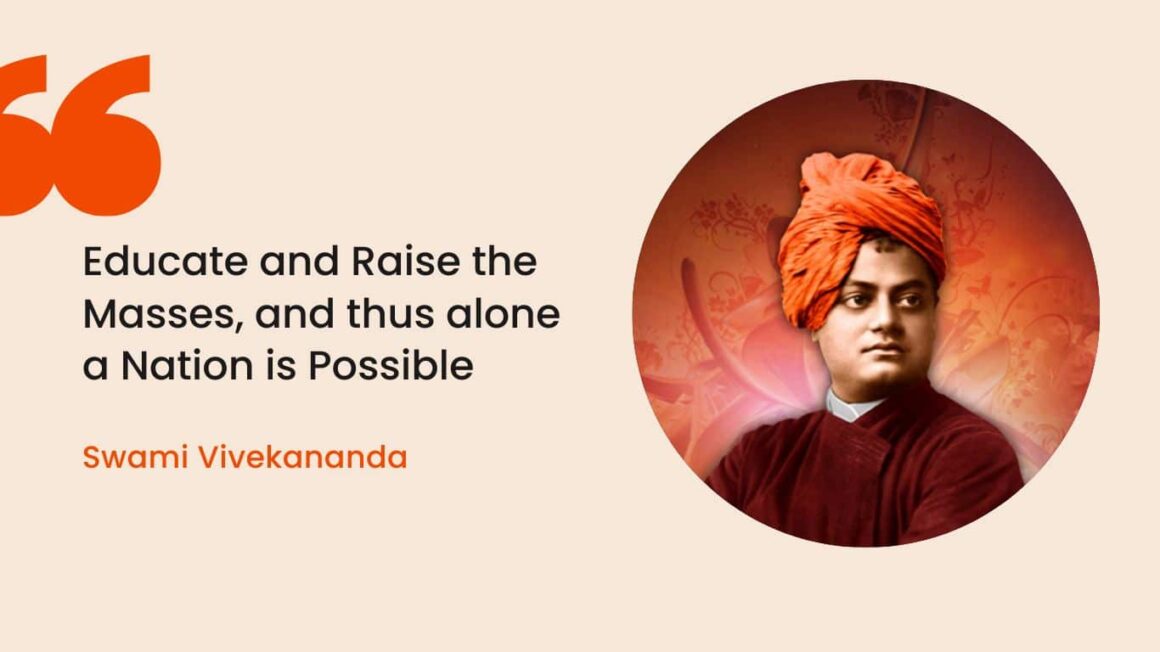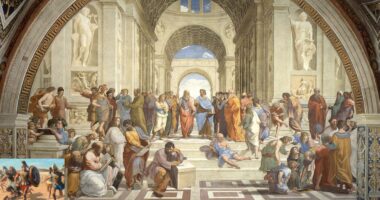
Educate and Raise the Masses, and thus alone a Nation is Possible
— Swami Vivekananda
This statement was given by Swami Vivekananda and implies that education and raising the level of knowledge and understanding among a population is necessary for the formation and maintenance of a strong and united nation. The idea is that an educated and informed population is better equipped to make sound political and social decisions, and is less likely to be divided or misled. This sentiment is often used as a call to action for governments and societies to invest in education and to make it more widely available to all members of the population.
Swami Vivekananda (1863-1902) was a Hindu monk, spiritual leader, and one of the most prominent figures in the Indian independence movement during the late 19th and early 20th centuries. He was a key figure in the introduction of the Indian philosophies of Vedanta and Yoga to the Western world, and is credited with raising interfaith awareness, bringing Hinduism to the status of a major world religion during the late 19th century.

Swami Vivekananda‘s Teaching
Swami Vivekananda’s teachings were primarily based on the principles of Advaita Vedanta, a form of Indian philosophy that emphasizes the unity of all things and the essential oneness of the individual self and the ultimate reality, or Brahman. He emphasized the importance of self-realization as the ultimate goal of human existence and argued that true spirituality is the realization of one’s own divine nature. His teachings also emphasized the universality of all religions, and he believed that all religions were different paths to the same ultimate goal of self-realization. He encouraged respect for the religious beliefs of others and encouraged the idea that the essence of all religions is the same, a call for spiritual harmony.
Vivekananda was also a strong advocate of social service and believed that true spirituality should be reflected in one’s actions and behavior. He emphasized that serving others was a path to self-realization and stressed the importance of selfless service to society. He encouraged people to take active roles in the betterment of their communities, and promote the idea that the true purpose of religion is not just to transcend the self, but also to serve others.
More about Swami Vivekananda
Vivekananda was born in Calcutta, India, and was originally named Narendranath Datta. He was influenced by his guru, Ramakrishna, from whom he learned the principles of Advaita Vedanta. After Ramakrishna’s death, Vivekananda traveled extensively throughout India, eventually settling in Chicago in 1893, where he represented India and Hinduism at the Parliament of the World’s Religions. He gained widespread acclaim for his speeches, particularly his opening address, in which he greeted the gathering with the words, “Sisters and brothers of America”.

His teachings emphasized the universality of all religions, the potential of every human being for spiritual enlightenment, and the importance of social service. He believed that the true purpose of religion was to transcend the self, and to serve others. Vivekananda is considered as a pioneer of the interfaith dialogue and his speeches on the principles of Vedanta and the interrelatedness of all faiths were well received by Western Audiences. His works and teachings continues to be influential to many, especially in the field of Yoga, Meditation, and Education and his birthday 12 January is celebrated as National Youth Day in India.
Explanation “Educate and Raise the Masses, and thus alone a Nation is Possible“
The statement “Educate and Raise the Masses, and thus alone a Nation is Possible” highlights the importance of education in the development of a strong and united nation. Education plays a crucial role in the formation of a society by providing its members with the knowledge and skills needed to participate in the political, economic, and social life of the country. Education not only empowers individuals to make informed decisions, but it also promotes critical thinking, creativity, and innovation, which are essential for a nation’s progress and prosperity.
One of the primary benefits of education is that it helps to reduce poverty and inequality. Education enables individuals to access better-paying jobs, which can lead to improved living standards and greater economic stability. This, in turn, can lead to a reduction in crime and social unrest, which are often the result of poverty and inequality. Education also enables individuals to become more politically active, which can help to promote democracy and good governance.
Education is also essential for the preservation of a nation’s culture and heritage. It provides individuals with an understanding of their country’s history and its place in the world, which helps to promote a sense of national identity and pride. It also helps to preserve a nation’s traditional customs and values, which are often under threat from globalization and the rapid pace of change in modern societies.
Education also plays a vital role in addressing the current and future issues of a nation. Through education, individuals can gain the knowledge and skills needed to tackle issues such as climate change, economic inequality, and political instability. This can be done by providing education on the science of climate change, the causes and consequences of economic inequality, and the importance of political participation. This will enable individuals to understand and address these issues, in turn, promoting sustainable development of a nation.
Conclusion
Education is essential for the development of a strong and united nation. It is a powerful tool that can be used to reduce poverty and inequality, preserve a nation’s culture and heritage, and address current and future issues. A nation that prioritizes education and makes it widely available to all members of the population is more likely to be politically stable, economically prosperous, and socially cohesive. The statement “Educate and Raise the Masses, and thus alone a Nation is Possible” highlights the importance of education in the development of a nation and the significance of taking steps to ensure that all members of the population have access to quality education.
Also Read: How To Help Your Child Succeed in School: Tips for Parents




